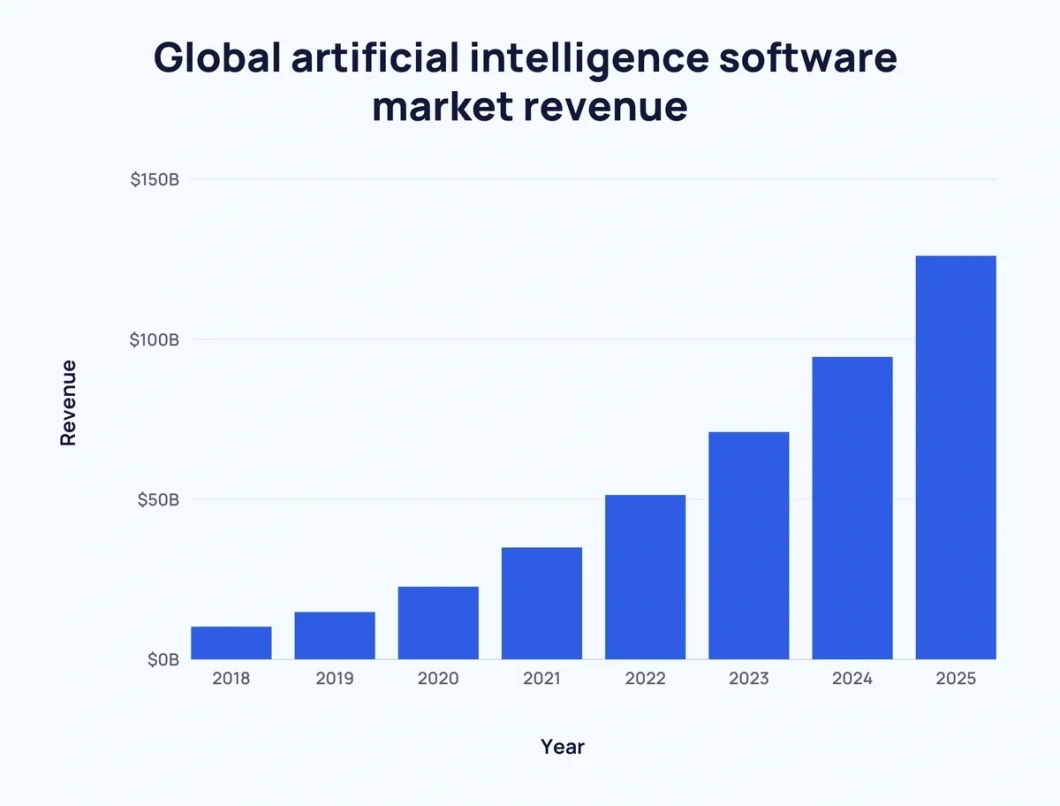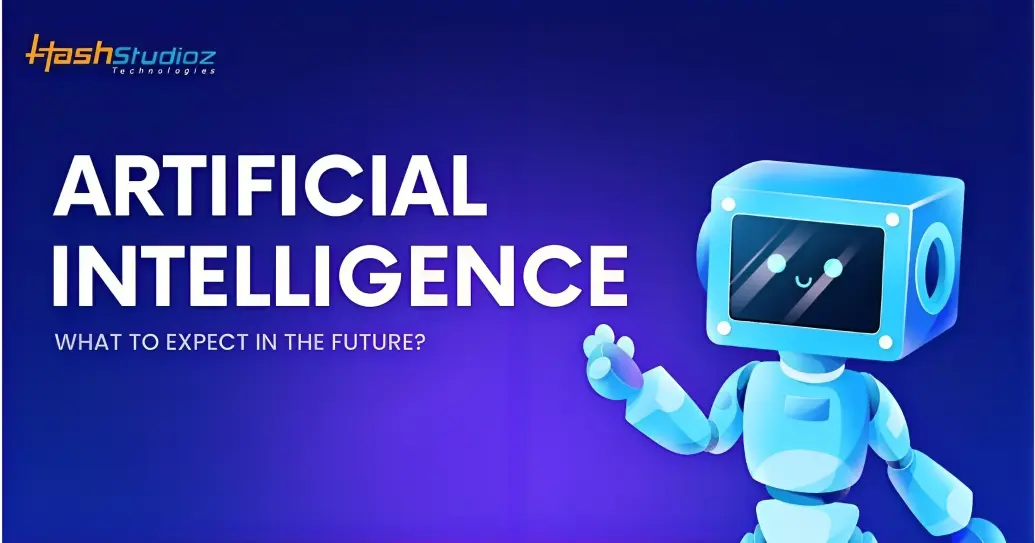Imagine a world where machines are our teachers, our friends, and our companions.
Where they can drive our cars, diagnose our diseases, and even write our creative content. This is the world of artificial intelligence (AI), and it’s a future that’s already starting to take shape.
Artificial intelligence (AI) is no longer just a concept confined to the realms of science fiction. Today, AI is an integral part of our daily lives, influencing various sectors from healthcare to transportation. As we look towards the future, the potential of artificial intelligence is vast and transformative.
In movies like “The Matrix” and “Terminator,” AI is often portrayed as a threat to humanity. But in reality, AI has the potential to be a powerful tool for good. It can help us solve some of the world’s biggest problems, such as climate change, disease, and poverty.
AI is already being used in a variety of ways today. For example: Tesla, Waymo, and other companies are developing self-driving cars that use AI to navigate the road and avoid obstacles. Amazon and other online retailers use AI to recommend products to customers based on their past purchases and browsing history. It’s also being used to develop new products and services, such as personalized shopping recommendations and AI-powered chatbots.
The global AI market is expected to reach $1.81 trillion by 2030:
Even while the AI industry is now rather large, over the next ten years, it is expected to increase by almost 13x. (GrandViewResearch)
During this forecast period, the AI market is predicted to increase by a CAGR of 38.1%.
The AI software market’s global annual revenue is currently over $50 billion (Omdia).

Table of Contents
- The Evolution of AI
- What Industries Will Be Affected by AI?
- Challenges and Considerations in AI Development
- AI’s Near Future
- Frequently Asked Questions
- 1. How can businesses benefit from artificial intelligence development services?
- 2. How does an artificial intelligence app development company create AI-powered mobile applications?
- 3. How does AI integration in mobile apps impact user experiences?
- 4. What role does artificial intelligence play in customizing app recommendations?
- 5. How does AI app development contribute to business growth and innovation?
The Evolution of AI
AI’s impact on technology can be seen in how it affects computing. Computers are now capable of analyzing massive volumes of data and making optimal decisions much faster than humans.
It has been a long road to artificial intelligence since 1954 when Christopher Strachey’s checkers’ program completed a whole game on a Ferranti Mark I computer at Manchester University.
Since then, AI has been used for sequencing RNA for vaccines and modeling human speech. Machine learning technologies that rely on algorithms and models and increasingly emphasize perception, reasoning, and generalization. Featuring innovations like these, AI has retaken center stage like never before – and it won’t relinquish it anytime soon.
What Industries Will Be Affected by AI?
AI is not just about computing. It has the potential to revolutionize many industries and aspects of our lives.
There is virtually no major industry that hasn’t been affected by modern AI – specifically “narrow AI,” which uses data-trained models to perform objective functions. It is especially true in the past few years, when robust IoT connectivity, the proliferation of connected devices, and faster computer processing have enabled significant growth in data collection and analysis.
Increasingly, companies spend billions on artificial intelligence products and services, tech giants such as Google, Apple, Microsoft, and Amazon create these products and services, universities emphasize AI in their curricula, and the U.S. Department of Defense is upping its AI game, so big things are bound to happen.
While some sectors are just beginning their journey into artificial intelligence, others have already been there and done that. There is still a long way to go for both. Despite this, AI’s impact on our lives cannot be ignored.
1. The Potential of Quantum Computing in Advancing AI
The potential of quantum computing to revolutionize AI by solving complex problems faster than traditional computers is widely recognized. AI training could be significantly accelerated, leading to breakthroughs in various fields, including drug discovery, climate modeling, and materials science. The synergy between AI and quantum computing will be a significant area of research and innovation in the near future.
2. AI-Powered Augmented Reality (AR) and Virtual Reality (VR)
The integration of AI with AR and VR technologies will lead to the creation of immersive and personalized experiences. AR/VR simulations can be enhanced by AI algorithms through the understanding of user preferences, the provision of real-time translations, and the improvement of overall interaction. This convergence will open up new possibilities for gaming, education, training, and simulation.
3. AI in Space Exploration and Astronomy
The vast amounts of data collected by space missions and telescopes will be significantly analyzed by AI. Celestial objects will be identified, space phenomena predicted, and mission planning aided by machine learning algorithms. Discoveries will be unlocked, and our understanding of the cosmos will be improved through the integration of AI into space exploration.
4. AI and Cybersecurity
As AI becomes more sophisticated, cyber threats are also becoming more advanced. Cybersecurity is being enhanced by AI, with cyberattacks being predicted and prevented in real-time. Anomalies and patterns in network traffic can be identified by machine learning algorithms, enabling potential security breaches to be detected early. Sensitive data and critical infrastructures will be safeguarded by AI and cybersecurity.
5. AI in Transportation
The transportation industry is one sector that is tipped to be dramatically changed by AI. AI will influence how we travel from point A to B in many ways, including self-driving cars and travel planners. Even though autonomous vehicles are still far from perfect, they will one day be able to transport us from one place to another.
6. AI in Manufacturing
AI has been beneficial to manufacturing for years. Manufacturing bots and robotic arms powered by AI have been around since the 1960s and 1970s, so the industry has adapted well to AI’s capabilities. Predictive analysis sensors keep equipment running smoothly as these industrial robots perform assembly and stacking tasks alongside humans.

7. AI in Healthcare
Artificial intelligence is already changing the way humans interact with medical providers in healthcare. Artificial intelligence is capable of identifying diseases more quickly and accurately, speeding up and streamlining drug discovery, and even monitoring patients using virtual nursing assistants.
8. AI in Education
Artificial intelligence in education will change the way humans learn. Artificial intelligence is enabling textbooks to be digitized, plagiarism detected, and students’ emotions gauged to determine if they are struggling or bored. AI will adapt the learning experience to the needs of each student both now and in the future.
9. AI in Media
AI is being harnessed by journalism as well, and it will continue to be used in the future. The emergence of generative AI writing tools, such as ChatGPT, has led to questions about their use in journalism.
10. AI in Customer Service
Customers dread getting a robocall, but AI in customer service can provide both customers and providers with invaluable insights. Virtual assistants and chatbots are AI tools powering the customer service industry.
Challenges and Considerations in AI Development
While AI offers tremendous potential, it’s crucial to address several challenges:
- Benefits and Risks: AI can lead to increased efficiency, productivity, and improved decision-making. However, it also raises concerns about job displacement, economic disruption, and the potential misuse of AI for malicious purposes.
- Explainability and Transparency: Understanding how AI systems reach conclusions is crucial for building trust and ensuring fairness. We need to develop methods to make AI decision-making more transparent.
- Safety and Security: Advanced AI systems raise concerns about safety and security. We need to develop safeguards to ensure that AI systems are reliable and cannot be easily manipulated.
- Regulation and Policy: As AI continues to evolve, legal frameworks need to be developed to address issues like data privacy, algorithmic bias, and the ethical use of AI.
Must Read: Devin AI: Redefining Software Development With The World’s First AI Engineer
AI’s Near Future
It is in two areas that AI research and experimentation will have the greatest ramifications in the near future: reinforcement learning, which uses rewards and punishments instead of labeled data, and generative adversarial networks (GAN), which allow computer algorithms to create rather than assess by pitting two nets against one another. Google DeepMind’s AlphaGo Zero illustrates the former, while original images and audio are generated based on learning about a certain subject, such as celebrities or music genres.
Ultimately, AI is poised to have a significant impact on sustainability, climate change, and environmental issues. Cities will become less congested, less polluted, and generally more livable through the use of sophisticated sensors.
It is possible to prescribe certain policies and rules once you have predicted something. Data from sensors on cars could be used to predict traffic problems and optimize car flow. By no means is this perfect. It is still in its infancy. Nevertheless, it will play a significant role in the future.
The long-term trajectory of AI research holds exciting possibilities:
- Human-AI Collaboration: The future of work may involve humans and AI working together to achieve optimal results. Humans can leverage AI’s capabilities for complex tasks while focusing on creativity, empathy, and problem-solving that require human judgment.
- Superintelligence: While still a hypothetical concept, some experts discuss the possibility of superintelligence – AI surpassing human cognitive abilities. The development of superintelligence raises significant ethical and philosophical questions that need to be addressed proactively.
This is just a glimpse of the future that AI could bring. As AI technology continues to develop, we can expect to see even more innovative and groundbreaking applications of AI in computing and many other fields.

Frequently Asked Questions
1. How can businesses benefit from artificial intelligence development services?
Businesses can benefit from artificial intelligence development services by harnessing AI power to optimize operations, enhance decision-making, improve customer experiences, automate tasks, and gain valuable insights from data. These services can lead to increased efficiency, cost savings, and a competitive edge in the market.
2. How does an artificial intelligence app development company create AI-powered mobile applications?
An AI app development company utilizes AI development tools, frameworks, and expertise to integrate AI algorithms and models into mobile applications. This involves data preprocessing, model training, integration of AI features, testing, and fine-tuning to ensure the app delivers the intended AI-powered functionalities.
3. How does AI integration in mobile apps impact user experiences?
Integration of AI in mobile apps enhances user experiences by providing personalized recommendations, intelligent search, natural language understanding for voice commands, real-time language translation, and other features that optimize app usability and engagement, making the user experience more intuitive and enjoyable.
4. What role does artificial intelligence play in customizing app recommendations?
Artificial intelligence utilizes data analysis and user behavior patterns to customize app recommendations. AI algorithms learn from user interactions and preferences to suggest relevant content, products, or services. This results in a more personalized user experience and increased user satisfaction.
5. How does AI app development contribute to business growth and innovation?
AI app development contributes to business growth and innovation by enabling businesses to offer innovative AI-powered solutions that attract a larger user base. This leads to increased customer engagement, improved brand reputation, and ultimately drives business growth through enhanced user satisfaction and loyalty.

